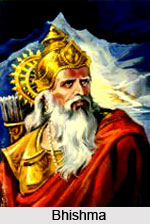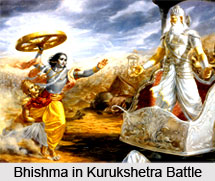 Bhishma, earlier known as Devabrata, was one of the central characters of Mahabharat. He is considered to be one of the important personalities of the Bharat clan. A truly religious person, he was endowed with unique spiritual insight and experience. This great personality was bestowed with the title of `Bhishma Pitamaha`.
Bhishma, earlier known as Devabrata, was one of the central characters of Mahabharat. He is considered to be one of the important personalities of the Bharat clan. A truly religious person, he was endowed with unique spiritual insight and experience. This great personality was bestowed with the title of `Bhishma Pitamaha`.
His early days
The youngest son of Santanu and Ganga, Bhishma is believed to have been born on account of a curse bestowed upon him by sage Vashishta. The story goes that before marrying Ganga, Santanu promised that he shall never question Ganga about her actions. However, when he observed that Ganga drowned their children as soon as they were born; he was bewildered and questioned Ganga about her actions thus breaking his promise. Before leaving Santanu she explained him the reason why she drowned their seven children before. She told him that those seven children were seven vasus who were cursed by sage Vashishta in their previous birth for having stolen his priced possession and that she had promised the eighth vasus that she will break them from their curse soon. While the former seven were freed of their curse, the eighth one could not be drowned. She took their son with her only to return him back as an educated and wise man.
The young Bhishma was taught the art of politics by Brihaspati, the guru of the Devas. He was taught Vedas and Vedanta by rishi Vasishta, and archery by Parashurama. Bhishma is considered to be one of the most dedicated officer. Mother Ganga saw to it that the best education and training is given to her son.
Bhishma Pratigya
`Bhishma` means `He of the terrible oath`. It refers to his vow of life-long celibacy. Devavrata became known as Bhishma because he took the Bhishma Pratigya the vow of life-long celibacy and of service to whoever sat on the throne of his father (the throne of Hastinapura).
 This was because his father Santanu wanted to marry a fisherwoman Satyavati. Her father agreed to give his daughter on a condition that Santanu make the child born to Santanu and Satyavati as his successor. This made Santanu despondent, as lawfully Bhishma was the true successor of the throne.
This was because his father Santanu wanted to marry a fisherwoman Satyavati. Her father agreed to give his daughter on a condition that Santanu make the child born to Santanu and Satyavati as his successor. This made Santanu despondent, as lawfully Bhishma was the true successor of the throne.
To pacify Satyavati`s father, Devavrata promised that he would never stake a claim to the throne, implying that the child born of Shantanu and Satyavati would become the ruler after Shantanu. At this, Satyavati`s father retorted that even if Devavrata gave up his claim to the throne, it was still possible that his (Devavrata`s) children would claim the throne. At this, Devavrata, to make his father happy, took the terrible vow, thus sacrificing his crown-prince title, and denying him the pleasures of intercourse.
Bhishma role in Hastinapura and in Mahabharat
Bhishma is known to have survived through several decades and had been a part of the state of affairs of Hastinapura. All throughout these decades he kept up with his word of being celibate all throughout his life. He dedicated his entire life to the state of affairs of the kingdom. He was one of the most respectable member of the kingdom and all the rulers sought his advices.
But sadly, despite his warnings the Kauravas fought a battle against their own cousins- the pandavas. Bhishma was the commander-in-chief for the Kauravas during the Mahabharat battle. Despite knowing that the Pandavas were innocent, Bhishma with a heavy heart fought against them.
On the tenth day of the Kurukshetra battle, Bhishma was attacked by Arjuna- who stood behind shikhandi and hurled the arrows at him. Though Bhishma knew it was Arjuna who was attacking him, he did not attack him for the reason that he did not wish to attack Shikhandi who was born as a lady. Therefore, Bhishma fell, his entire body a pincushion of Arjuna`s arrows. He lay on the `bed of arrows` till the end of the battle, and chose to die only after learning that the Pandavas had won, as he was now assured that the throne of Hastinapura was in safe hands.
It is believed that there was no person like Bhishma on planet earth. His whole life was full of pain, but he never complained about it.












